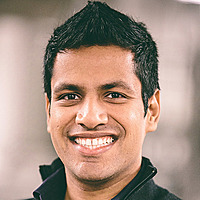- Undergraduate
- Graduate
- Research
- News & Events
- People
- Inclusivity
- Jobs
Back to Top Nav
Back to Top Nav
Back to Top Nav
Title: "Practical and Opportunistic Health Sensing Using an Ecosystem of Consumer Smart Devices"

Title:
Practical and Opportunistic Health Sensing Using an Ecosystem of Consumer Smart Devices
Abstract:
Personal wearable fitness devices (e.g., FitBit, Apple Watch) can go beyond providing information such as the number of steps taken, hours spent exercising, and a coarse measure of sleep quality. Though highly valued by the user, rough activity estimates fail to provide medically-actionable information. We are investigating two wearable form factors: smartwatches and eyeglasses to detect a user’s behavior, their physiology, and how this information can be clinically relevant. Considering wearables are already sensor-laden, we are building machine learning models that leverage the onboard sensors and ensuring immediate deployability and impact of our efforts. We are evaluating the efficacy of our machine learning models to identify users suffering from depression, fatigue, anxiety, ADHD, etc. Moreover, given wearables are continually evolving, we are investigating what new form factors and capabilities can make them smarter and more clinically useful. For example, we are exploring ways to measure the wearer’s diet and how their body reacts to what they eat. Ultimately, we aim to develop a suite of wearables that holistically understand the wearer’s behavior, physiology, and the relation between the two.
Bio:
Mayank is an Assistant Professor in ISR and HCII in the School of Computer Science at Carnegie Mellon University. He leads the Smart Sensing for Humans (Smash) Lab at CMU and focuses on designing new sensing systems using sensors and devices that are already present in a user's environment. The lab aims to solve hard problems in various domains, including health sensing, technologies for global development, and novel interactive systems. Some of his inventions are currently deployed in clinics around the world and are used by several thousand patients every month. Many of these technologies are currently going through regulatory approvals. Mayank received my Ph.D. in Computer Science and Engineering from the University of Washington in 2016.
Events are free and open to the public unless otherwise noted.